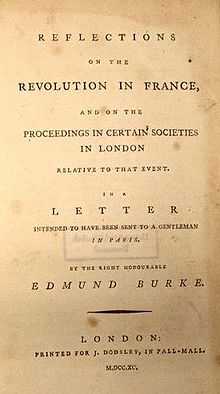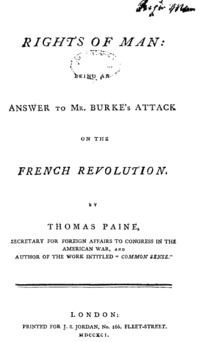Revolution Controversy


The Revolution Controversy was a British debate over the French Revolution, lasting from 1789 through 1795.[1] A pamphlet war began in earnest after the publication of Edmund Burke's Reflections on the Revolution in France (1790), which surprisingly supported the French aristocracy. Because he had supported the American colonists in their rebellion against England, his views sent a shockwave through the country. Many writers responded, defending the revolution in France, among them Thomas Paine, Mary Wollstonecraft and William Godwin.[1] Alfred Cobban calls the debate that erupted "perhaps the last real discussion of the fundamentals of politics" in Britain.[2] The themes articulated by those responding to Burke would become a central feature of the radical working-class movement in Britain in the nineteenth century and of Romanticism.[1] Most Britons celebrated the storming of the Bastille in 1789, believing that France's monarchy should be curtailed by a more democratic form of government. However, by December 1795, after the Reign of Terror and war with France, there were few who still supported the French cause.
Burke's Reflections
Responding in part to a sermon defending the French Revolution given by the Dissenting clergyman Richard Price entitled A Discourse on the Love of our Country (1789), Edmund Burke published his Reflections on the Revolution in France in an effort to advance arguments for the current aristocratic government. Because Burke had previously been part of the liberal Whig party, a critic of monarchical power, a supporter of the American revolutionaries, and a critic of government graft in India, most in Britain expected him to support the French revolutionaries. When he failed to do so, it shocked the populace and angered his friends and supporters.[3] Burke's book sold 30,000 copies in two years.[4] The Reflections defended "the aristocratic concepts of paternalism, loyalty, chivalry, the hereditary principle" and property.[4]
Burke criticized the view of many British thinkers and writers who had welcomed the early stages of the French Revolution.[5] While the radicals saw the revolution as analogous to Britain's own Glorious Revolution in 1688, which had restricted the powers of the monarchy, Burke argued that the appropriate historical analogy was the English Civil War (1642–1651) in which Charles I had been executed in 1649. He viewed the French Revolution as the violent overthrow of a legitimate government, contending that citizens do not have the right to overthrow their government. Civilizations and governments, he maintained, are the result of social and political consensus; their traditions cannot be challenged—the result would be anarchy.
Responses
Liberals such as William Godwin, Thomas Paine, and Mary Wollstonecraft argued for republicanism, agrarian socialism, and anarchism.[6] Most of those who came to be called radicals emphasized the same themes: "a sense of personal liberty and autonomy"; "a belief in civic virtue"; "a hatred of corruption"; an opposition to war because it only profited the "landed interest"; a critique of the monarchy and the aristocracy and its perceived desire to draw power away from the House of Commons of Great Britain.[7] Many of their works were published by Joseph Johnson, who was eventually jailed for his seditious activities.
Wollstonecraft had been much influenced by the ideas she ingested from Price's sermons at Newington Green Unitarian Church and the whole ethos of Rational Dissent in the village of Newington Green.[8] These seeds germinated into A Vindication of the Rights of Men, her response to Burke's denunciation of her mentor. Paine, one of the Founding Fathers of the United States argued in Rights of Man that popular political revolution is permissible when a government does not safeguard its people, their natural rights, and their national interests.
This Controversy left further legacies. Wollstonecraft's most famous work, A Vindication of the Rights of Woman was written in 1792, in the spirit of rationalism extending Price's arguments about equality to women. Anna Laetitia Barbauld, a prolific writer admired by Samuel Johnson and William Wordsworth and wife of the minister at Newington Green, alluded to Burke's work and his opponents in her "Sins of the Government, Sins of the Nation" (1793).
Notes
Bibliography
- Butler, Marilyn, ed. Burke, Paine, Godwin, and the Revolution Controversy. Cambridge: Cambridge University Press, 1984. ISBN 0-521-28656-5.
- Gordon, Lyndall. Vindication: A Life of Mary Wollstonecraft. Great Britain: Virago, 2005. ISBN 1-84408-141-9.